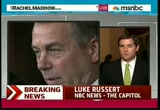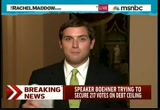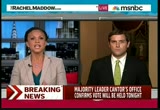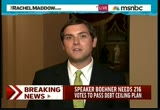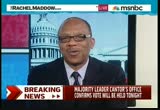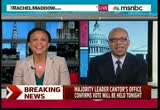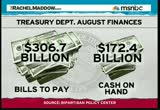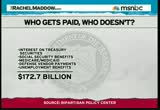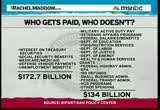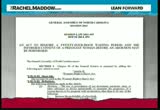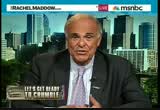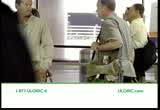tv The Rachel Maddow Show MSNBC July 28, 2011 6:00pm-7:00pm PDT
6:00 pm
massive cuts to govern spending. >> the political defense of the president on that tax situation is it was borne on the campaign trail. and it was brave enough for him to say i'm willing to raise at least one tax rate. bill clinton didn't do that. he ran on the middle class tax cut, which then he got rid of it when he became president. so being willing to raise one bracket is about as much as you can ever ask for politically. ezra klein, thank you very much for joining me tonight. >> thank you. you can have the last word online at our blog or follow my tweets @lawrence. the show sh rachel madd "the rachel maddow show" is up next. melissa harris in for her tonight. >> a breaking news night, huh, lawrence? this will be fun. thanks to all of you at home for staying with us for this next hour, because this is in fact a breaking news hour.
6:01 pm
we are going to report on this high stakes, high drama battle over on capitol hill, a battle over whether or not this country should enter into its first-ever self imposed default. at this hour, the united states house of representatives stands in recess as it prepares to vote on house speaker john boehner's plan to raise the debt ceiling. now, this is a bill that called for about $1 trillion in spending cuts only. and it raises the debt ceiling for only six months, at which point we could have another breaking news night, because this could happen all over again. now, this was a vote that was supposed to happen about three hours ago, when we were working on a different kind of show. but at 6:00 tonight, about 15 minutes before the vote was scheduled to happen, it was abruptly postponed. word came down that speaker boehner and house republican leaders didn't have the votes they needed. remember, the votes they needed
6:02 pm
to pass their own bill. so after about two hours of debate on the debt ceiling, members of the house suddenly began debating the naming of a post office in peoria, illinois, instead. now, while that was happening, speaker john boehner was locked behind closed doors trying to quell the rebellion brewing in his own caucus. now, we knew last night -- we heard a lot about this town movie that the republicans had shown. but now it was beginning to look a bit more like godfather 1, as one by one the house republicans who planned to vote no on the bill were hauled in to the speaker's chambers where mr. boehner reportedly attempted to arm twist them into voting yes. after leaving speaker boehner's office, republican congressman louie gohmert of texas informed reporters that he was still, quote, a bloodied and beaten no. and according to nbc's luke
6:03 pm
russert, republican congressman mick muvaney of north carolina who also plans to vote no exited boehner's office and headed straight to a small chapel in the capitol, telling reporters he was going to pray for his leadership. now, republican congressman steve southerland of florida also told reporters he was a no. and when asked if anything could change his mind, he said, quote, if the lord takes me home right now. so as speaker boehner struggles at this hour to get his members in line to pass his bill, the other chamber of congress, the u.s. senate, is standing by waiting to vote that bill down. a spokesman from democratic senate majority leader harry reid tweeting late night, quote, the senate stands ready to defeat the boehner plan, whenever house republicans can get their act together. let's go now to the capitol and to nbc correspondent luke russert for the latest.
6:04 pm
hi, luke. >> hi, melissa. and a wonderful introduction telling everybody what occurred. since 6:00 we have been in a holding pattern here, and that's really because at this moment, speaker boehner still does not have the votes to pass his debt limit extension plan. over the last few hours, we can tell you that members have been brought in and have sat before speaker boehner, eric cantor, kevin mccarthy, they have twisted their arms trying to convince some of these no votes to come on the yes way. interesting folks to look at. the south carolina delegation, five republicans there, the gop delegation. they all think now they are going to stay as no votes. and that's important because a lot of them follow jim demint in the senate and what his lead is. a few other interesting things that have occurred here on what is quite a chaotic night. you mentioned the prayer off to side. we had an altercation between police officers and reporters trying to clear out the hallway in front of speaker boehner's office because there were so
6:05 pm
many reporters wanting to ask so many questions. the one answer from republicaide republicans tonight that a vote will occur, they don't know when. but the idea is once they get to 217, and 216 is the number, and they have that one gimme vote, they will go to the floor. some members of congress on the republican side right now are eating pizza in the whip's office, having a pizza party. and it's one of those situations, melissa, where honestly nobody, reporter, member of congress, anyone, has any idea what exactly is going to happen tonight. as it's all being -- going on behind closed doors right now. >> when i was saying that it reminded me of "the godfather" i was thinking of that moment when he was saying we're going to go to the mattresses. but apparently 19 boxes of pizza will stand in for mattresses. >> temptation with food indeed. so there's still a long way to go on it. and it's really quite striking because there is a lot of confidence coming from speaker
6:06 pm
boehner today as well as majority leader eric cantor and mccarthy. they have not been able to convince their members that if they don't vote for this they lose all leverage. they even said today that a vote against speaker boehner today is a vote for obama. that message has not registered, at 9:00 p.m. still waiting on the vote. >> what does speaker boehner have available to him at this point other than pizza and the fear of appearing to be supportive of the president to get these folks in line? if you think about the word "whip", right, what the minority and majority whips do, they are meant to whip people into line, to get them on the side of their leader. what does he have at this point to actually do that arm twisting? >> well, here's the ironic thing, melissa. one of the first things the house gop did when they came into power was have an all-out ban on earmarks. i think if you speak to them privately tonight, they wish they had that capability to be able to hand a bridge project to
6:07 pm
some of these members on the fence. they no longer have that. we have heard all sorts of rumors that possibly they could move people around on committees. but john boehner came into the house saying he would do things a different way, he wouldn't play those back room parlour games. as of right now it seems they are sticking to that pledge. we have heard reports they are trying to recruit former governors, senators, anyone in the republican party who supports the boehner plan to try and call these no votes and say, get onboard. someone that they might respect who might not be in congress. they are leaving no stone unturned here, because they realize how embarrassing it would be if they cannot get out of the house tonight. it essentially says that the gop leadership is not in control of their conference. and that is something they have been pushing back hard on all week. talking about the tea party versus the establishment rivalry. as it stands right now, these freshmen members, a lot who have said to me personally, if this bill is going to be voted down
6:08 pm
by the senate, i don't want to walk a plank right now for no reason and upset people in my hometown over this. so the consensus here on capitol hill is that because it's gotten so late, because so much is invested into this, they will find a path to 216, but it's not going to be easy, and it certainly is not going to be at a decent hour, if you will. >> so let me ask you that question. is it possible that speaker boehner will finally pull the plug on this? that he'll decide he doesn't have enough votes, that after all, one of the reasons that these constituents put these representatives in office was the idea that they did buck the trends, they didn't follow the rules, that they weren't in line? i mean, that is precisely the basis on which so many of them ran. so it is potentially in their interest in terms of the election they face not to ever sort of fall in line here. is there a point when it simply too late to bring a bill to a vote tonight? >> it's never too late.
6:09 pm
in 2003, they actually kept the vote open for hours, up until 3:00 a.m. so it can be done. there is a lot on the line. not only for john boehner but for eric cantor tonight. if they can't deliver this vote, they not only lose all leverage negotiating with harry reid and the united states senate, but it sends a message they do not have control over their conference. and that is something they won't allow to happen. there is a thing we call on capitol hill called the dracula effect. that once the sun starts to come up and people are locked into a room, they suddenly turn to the side that will get them out of the room. but as we stand right now, if that were in fact to happen, if this vote were to go down and republicans weren't able to get to 216, that would be a shocker, especially with the confidence that was brimming from them just a few hours ago. >> sure. >> essentially saying that, you know, we will -- by tonight, we will have passed two debt limit extension votes, the speaker's
6:10 pm
bipartisan conference plan and the cut, cap, and balance. but so far, that's not the case. >> luke russert, nbc correspondent and a man about to have a cup of coffee. >> great to see you, melissa. take care. joining us now is eugene robinson, msnbc political analyst and pulitzer prize-winning columnist. >> you picked a good night to sit in for rachel. >> i'm a college professor. we do things in 10-year stints, not in 10-minute stints. but i hear you. i know the president has been reluctant to pursue this option, the 14th amendment question. but i know that you have a lot to say on this, and i have been thinking and talking about it quite a bit too. if this just keeps going down in this way, should the president step in? is it time for him to use the 14th amendment to raise the debt ceiling? >> i think the president has to step in. look, if we go through the
6:11 pm
weekend, and there's no agreement on anything, and the parties are so far apart that it's cle it's clear there's not going to be any agreement, there won't be any time anyhow. you read the 14th amendment, and you look at what the high court has said about presidential powers or allowed in terms of presidential powers in the past, and it seems to me that the president has not just the right but the duty to step in, and avert a looming national disaster. i think that's one of the implicit powers of the presidency, right? you're supposed to keep really bad things from happening to the country. any president is supposed to do that. and there is that language in the 14th amendment that seems to be, you know, you can interpret it as a slam dunk. you can go ahead and do it. and then if somebody wants to bring a court case later, fine. the supreme court can decide at its leisure. but the disaster will have been averted. i don't think there's a choice. >> well, look, i have been
6:12 pm
thinking about this a great deal, ever since i read this great editorial that suggested that this 14th amendment piece and what was going on with the debt crisis was in part like a game of chicken, right? they are driving their cars towards each other. at this point, they are throwing their steering wheels out of the window to make it seem like they -- you know, like they have to go forward. >> that's right. >> but at what point does the president have to reattach this steering wheel and in fact veer us off? i mean, is there a moment -- is it tonight, if boehner can't get this passed, and it becomes clear that no republican compromise is possible? or does he wait until august 2? when is that final moment? >> i don't think you go all the way up to august 2, because i don't want to be around the stock market on august 1 if this is the situation on august 1. but i think sometime over the weekend, clearly. you could get conceivably past tonight, and say that, well, ok, maybe boehner can resurrect this
6:13 pm
thing by early tomorrow, and there's still time to get to the senate, although the senate takes a year to do anything. but, you know, at some point over the weekend, i think you have to -- if you're going to do it, and you're the president, you have to say, no, actually, i have a spare steering wheel here. i'm going to reattach it now. i'm going to solve this. but until that moment, they're going to continue to say there is no alternative. jay carney, the press secretary, was apocalyptic today. we are going off the cliff. there is no way out. we have -- you know, there's no exit ramp. there's nothing but the abyss in front of us. and so as of now, we hurtle toward the abyss. >> let me ask you one more question about the abyss. i try really hard not to be a conspiracy theoryist. i really do try to be as recently as possible. but is it possible that this is precisely the plan, is to push the president into making a choice that could potentially be at some point labeled an
6:14 pm
unconstitutional choice or an illegal choice, one that might open him up to action on the part of the house of representatives, namely articles of impeachment at some point? is that the goal, to push the president to do something that can be profoundly damaging to him, despite the fact that it might be the only redemption possible for the country and the economy? >> i don't think they're that diabolical. john boehner could not go out on this limb and guarantee this vote and then have it fail and think that somehow that was a good idea for him. and as things stand now for the two parties, this is not a zero sum game. this is a negative sum game. neither party is going to come out looking good. the republicans, if there is any
6:15 pm
sort of deal, will get more of what they wanted, a lot more of what they wanted than the democrats did. so you can say in that sense the republicans will have won. but the public is not happy with either party right now. and neither party is going to be able to say, boy, we really came out of this smelling good. >> i love it. mitch mcconnell is the line that tells us that there is not a conspiracy. that's great. >> he is the most honest guy in washington. he says what he's doing, you know. if he hasn't said it, they haven't quite got to that point. >> i love it. eugene robinson, msnbc political analyst and pulitzer prize-winning columnist for "the washington post." thanks for being here. >> thank you, melissa. you have a cup of coffee to. what happens if there isn't a deal soon? what bills won't get paid first? one wonders if the republicans in the house of representatives have thought of that. you'll see what i mean in just a minute. we'll be right back.
6:16 pm
this past year alone there was a 93% increase in cyber attacks. in financial transactions... on devices... in social interactions... and applications in the cloud. some companies are worried. some, not so much. thanks to a network that secures it all and knows what to keep in, and what to keep out. outsmart the threats. see how at cisco.com cisco.
6:18 pm
high political drama tonight on capitol hill. we'll present the data to explain just how high the establishes are and just how deep the drama is in just a minute. stay with us. introducing the schwab mobile app. it's schwab at your fingertips wherever, whenever you want. one log in lets you monitor all of your balances and transfer between accounts, so your money can move as fast as you do. check out your portfolio, track the market with live updates. and execute trades anywhere and anytime the inspiration hits you. even deposit checks right from your phone. just take a picture, hit deposit and you're done. open an account today and put schwab mobile to work for you.
6:19 pm
we are still waiting at this hour for the u.s. house of representatives to vote on house speaker john boehner's bill to temporarily raise the debt ceiling. in exchange for about $1 trillion in spending cuts. now, this vote was supposed to happen three hours ago, and it could happen any minute. but there is a sign that it might take a little while, because pizzas were seen going
6:20 pm
through the metal detectors at the house of representatives, so who knows what a long night we may all be in for? as we wait, here is the cold, hard reality of what we're facing if congress and president obama can't reach a deal in the next five days. it will be all eyes away from the house, and on to the u.s. treasury department. if the debt ceiling isn't raised by august 3, the treasury department will be the ones who have to decide who gets paid, and who doesn't. in the month of august, here's what the treasury finances looked like. they have about $306 billion worth of bills to pay. but only $172 billion with which to pay those bills. since they won't have the authority to borrow any more money, that means some bills get paid, and others don't. every single month, the treasury department writes, get this, $80 million different checks. for everything from big ticket items like social security, veterans benefits, and
6:21 pm
nondefense contracts, to smaller payouts, to folks who are, for example, victims of black lung disease, or people who are railroad retirement board pensioneers. it's 80 million checks every single month. and, again, only about half the money they'll need to make good on all of those payments. so what does treasury do? who gets paid? who doesn't? the bipartisan policy center has laid out a possible scenario in which the treasury department only pays the following bills in august. interest on our debts, social security benefits, medicare and medicaid, defense contracts, and unemployment benefits. just paying those bills, just those, not everything we owe, just those, brings us to about $172 billion. which if you'll remember is all the money that they will have on hand. if only those programs get paid, here, my friends, is what doesn't get paid.
6:22 pm
military pay for active duty soldiers, veterans affairs programs, salary and benefit for federal employees, department of education, food services for low income women, infants and children, the department of labor, the department of justice, the department of energy, health and human services grants, the federal highway administration, the epa, irs refunds, the small business administration, the federal transit administration and housing assistance for the poor. i'm sorry. really. if we don't raise the debt ceiling, there is no money to pay for any of that stuff. these are the choices the treasury department could be facing over the next few weeks if there's no deal on the debt ceiling. obama administration officials will reportedly brief the public after the markets close tomorrow about how they'll prioritize all of these payments. now when people talk about not raising the debt ceiling as economic armageddon, that list,
6:23 pm
that exhausting list, that breathtaking out of me list that i just read, that's what they're talking about. but here is the thing. sometimes, you know, we've made this argument about your individual household. you know, you don't have enough money. you have to make some hard choices. but this doesn't have to happen. that's a real crisis. this doesn't have to happen. the treasury department doesn't have to be put in the position of being the arbitter of who gets paid, senior citizens or military veterans. this is a manufactured crisis that for some reason republicans in washington have decided to burden us with. it's like if you're imposing -- if you're facing an imposing pile of dirty laundry in your house, but rather than just sticking your clothes in the washer, you decide to burn the entire house down instead. our house is still standing. why are we threatening to light
6:24 pm
the match? to help me answer this question i'm joined now by jared bernstein, former member of president obama's economic team and former economic adviser to vice president biden. he is of course an msnbc contributor. thank you for your time. >> my pleasure, melissa. >> i really appreciate you being with us on this night when we are trying to figure out what all of this means for those of us who are not on capitol hill eating pizza. now, if you're looking at this, and these different bundles -- these different possibilities of the choices that the treasury department might make, how do you think the from isstreasurey department will go about deciding to pay first? >> well, treasury bonds will be paid first. because if you do that, you don't meet the official definition of default. so that is unquestionably going
6:25 pm
to be the first amount shaved off the top of that $172 million of outflows. and that's $29 billion. so that comes right off the top. and then, you know, just as the bipartisan policy commission set it up in your very, i thought, thorough intro, then you start picking and choosing. as you mentioned, social security, medicare, medicaid, those are both about $50 billion each. but once you start getting down there, you know, i think a lot of americans -- you're a political scientist. i'm sure you know. a lot of americans think, after that it's just, you know, foreign aid or something like that. but in fact, after that, it's active military pay. our armed forces, our uniformed armed forces. it's veterans benefits. it's nutritional programs for kids. that's what we're talking about here. and as you correctly pointed out, completely manufactured. total self inflicted wound here. >> i would not want to have to make a decision between on the
6:26 pm
one hand paying our active duty military women and men in the field right now, and making sure that a child in a poor neighborhood can eat. is there some kind of mechanism that the treasury department can use to make sure that the ones who most need the money will in fact get it? >> not on the fly. i mean, you could ask yourself, would they be able to, for example, send out social security benefits to low income people and not high income people. i'm not aware of any mechanism by which they could do that. now, there are certain programs, and you mentioned food and nutrition programs or pell grants for that matter. those go to disproportionately low income people. they could put those on the list. but you want to take medicare off the list? health care security depends on that for our retirees. can i make another point here, melissa, related to this? >> absolutely. >> think about this. if you follow the path that you're talking about, the priorization path, you're going to be interacting $130 billion
6:27 pm
with a b dollars from this economy per month. i mean, that is the biggest negative tank the economy program i could ever conceive of. and what you're going to do to an economy that's already frail, as we know, based on recent employment reports, is absolutely double dip territory. so this has -- this goes way beyond those who are directly affected in the very harmful ways we mentioned so far. >> i truly appreciate you making that point because i know, you know, the producers, the staff, you know, me, we've been sitting around trying to ask this question. is there anyone who is safe from this? you know, as exhausting as that list was that i just read, maybe if you're a viewer at home right now you're thinking, i don't use the department of justice very often, so no big deal for me. but what you've just said suggests that this is not just about who won't get those immediate checks, but the big picture.
6:28 pm
>> exactly right. if you look as i do -- if you look at the median real wage right now, that is the actual paycheck of the typical working person, right, it's already falling in real terms, a percent or two per year, and that's just based on very high unemployment and some receipt inflationary issues we've been facing. so people are obviously already struggling with what feels very much like an ongoing recession. what this does is it makes that deeper times about four. and the reason i say four, and i'm not just pulling that out of the air, the reason i say four is basically this is a negative recovery act times four. whatever stimulus the recovery act was helping to pump into the system on a monthly basis, this is about four times negative that kind of consideration otra the economy. >> i can see the capitol right
6:29 pm
behind you. can you go up there maybe and help them see what is at stake here? >> i saw one of the pictures on before. and i thought, lights on, nobody home. >> thank you so much for joining us. >> thank you. if immediately needs go unmet in post default america, imagine what will happen to huge long-term problems like our crumbling bridges and roads. whatever you imagine the problems will be, we'll have the actual data, and former pennsylvania governor edren dell next. stay with us as we wait on the house republican caucus to make its next big move. finally, there's a choice for my patients
6:30 pm
with an irregular heartbeat called atrial fibrillation, or afib, that's not caused by a heart valve problem. today we have pradaxa to reduce the risk of a stroke caused by a clot. in a clinical trial, pradaxa 150 mg reduced stroke risk 35% more than warfarin. and with pradaxa, there's no need for those regular blood tests. pradaxa is progress. pradaxa can cause serious, sometimes fatal, bleeding. don't take pradaxa if you have abnormal bleeding, and seek immediate medical care for unexpected signs of bleeding, like unusual bruising. pradaxa may increase your bleeding risk if you're 75 or older, have kidney problems or a bleeding condition, like stomach ulcers. or if you take aspirin products, nsaids, or blood thinners. tell your doctor about all medicines you take, any planned medical or dental procedures, and don't stop taking pradaxa without your doctor's approval, as stopping may increase your stroke risk. other side effects include indigestion,
6:31 pm
6:33 pm
while we wait out the house of representatives, an update on the story we reported last night on the woman's right to know act in north carolina. it is another of this year's republican moves to make it more difficult and frankly more traumatic for a woman to choose a legally protected medical procedure. the unusually conservative republican-led legislature first passed the bill last month. it requires a 24-hour waiting period. mandates that women seeking the procedure hear all of the physical details of the fetus and receive state approved but medically unnecessary counseling. the democratic governor vetoed the bill. we described her last night as the thin blue line between conservative social policy and women's rights. well, this morning, the north carolina state senate joined the state house in overriding governor purdue's veto, meaning that the right to know act will now become law.
6:34 pm
and north carolina is another big step closer to being kansas. we'll be right back. i never saw the traffic stop. it all happened so fast. it was clearly too late for me to do anything as my mercedes collision system automatically kicked in. the next thing i know, the mercedes stopped itself. ♪ watching what mercedes has done in bringing together these sensors in a car with software that has the ability to save your life. that's magical software. [ male announcer ] the innovation, the engineering of mercedes-benz. the best or nothing. of mercedes-benz.
6:35 pm
and when it does,t can turn romantic anytime. men with erectile dysfunction can be more confident in their ability to be ready with cialis for daily use. cialis for daily use is a clinically proven low-dose tablet you take every day so you can be ready anytime the moment's right. tell your doctor about your medical condition and all medications, and ask if you're healthy enough for sexual activity. don't take cialis if you take nitrates for chest pain, as this may cause an unsafe drop in blood pressure. do not drink alcohol in excess with cialis. side effects may include headache, upset stomach, delayed backache, or muscle ache. to avoid long-term injury, seek immediate medical help for an erection lasting more than 4 hours. if you have any sudden decrease or loss in hearing or vision, stop taking cialis and call your doctor right away. ask your doctor if cialis for daily use is right for you. for a 30-tablet free trial offer, go to cialis.com.
6:36 pm
somewhere in america, a city comes to life. it moves effortlessly, breathes easily. it flows with clean water. it makes its skyline greener and its population healthier. all to become the kind of city people want to live and work in. somewhere in america, we've already answered some of the nation's toughest questions. and the over sixty thousand people of siemens are ready to do it again. siemens. answers.
6:37 pm
we're still watching for word and waiting to hear about a vote in the house of representatives on speaker john boehner's plan for raising the debt ceiling. all day, house republicans have been trying to round up enough votes to pass it. they said they intend to vote on it tonight. either way, whether we see painful cuts in spending or whether the u.s. defaults, shudder, on its debt, we're looking at real consequences for the nation. we got a little preview of that yesterday, where in one very small part of america, this was the morning commute. >> this is crazy. look, look, look, look. >> wow. >> look at that [ bleep ] over there. >> oh, man. >> this is not an earthquake. or a natural disaster of any kind. you're looking at the bronx in
6:38 pm
new york city, where a water main installed in 1903 finally burst on wednesday after 108 years of what the mayor called yoeman service. a water main for new york city is a serious thing, with really a lot of water. enough water filled the streets to reach the hoods of cars, enough to damage two gas mains, enough to make you wonder why, in the nation's first city, why is it running on century-old infrastructure? listen, it costs money to build the stuff we use every day. the water mains and highways, the electric grids, the sidewalks. the giant hydro electric dams. and it also costs money when you don't keep the stuff you've got in good repair. now, the talk in washington this week is all about spending cuts. how we have all got to sacrifice or the economy will never survive. but there's also this danger of a pennywise and pound foolish.
6:39 pm
you think you're saving money by cutting a corner, but you're actually making a bigger problem in the long run. now a new report by the american society of civil engineers warns that if we keep ignoring the problems with our roads and our bridges, we'll drag the american economy down by $3.1 trillion by 2020. we'll lose 877,000 jobs. already, shortcomings in our infrastructure cost us $129 billion last year. that is b-b-billion with a b, as in a mighty big number. we lost $32 billion just waiting around for the chance to go. say what you want about tax breaks for the rich. but if you're stuck in traffic, your mercedes is stuck right along next to my chevy. and heaven for bid that a bridge falls down, because we are all in this together. rich, poor, whatever.
6:40 pm
infrastructure is like that. it's the ultimate expression of collective will, where everyone pays and everyone benefits. we are, after all, stakeholders in our nation. if stuff like a water main breaks, you can go ahead and think of that water main as your water main, because it is. and what if we left the stuff that we own, our stuff, just fall apart? now, we have been talking on this show about happens if congress lets america default on its debt. if they create a situation where america can't pay its bills. the bipartisan policy center has scenarios for that. and the first of them is that we would cut off $5.6 billion for stuff like highways and trains and airports. think about the long-term cost of that, the next time you're just sitting around on the road. joining us now is nbc news
6:41 pm
political analyst and former pennsylvania governor ed rendell. governor rendell, it is a pleasure to see you tonight. >> good evening, melissa. >> thank you for being here on a night of breaking news but where we still have to keep our eye on still sort of the long-term questions. you are truly an infrastructure expert. describe, if you will, your experience of the failing infrastructure in your own home state of pennsylvania. >> well, in pennsylvania, we're faced with all of the challenges of an older northeastern state. we have the highest number of structurally deficient bridges in the country. although as governor, we put more money into bridge repair than the last five administrations put together, and we made a dent in that. but we still have over 5,500 structurally deficient bridges. each of those bridges is a potential problem, a serious problem. some of the bridges will be weight limited, some of them closed, and heaven forbid some of them will fall. we came this close to having a bridge that supports i-95
6:42 pm
through philadelphia buckle because a pier had a crack in it this big, and it was only found by accident by penn-dot consultant who was going for a cheese steak at a place underneath that bridge. it was sheer happenstance. and i-95 was closed for three days. 180,000 vehicles a day go over that. so the cost is incredible. that american society of civil engineers report -- we waste extra gasoline, we waste by sitting in traffic, by going around in detours, damage to our cars by inadequate roads and bridges, and that's not even counting the calamities. cedar rapids, the levees broke because they weren't maintained. $1.2 billion worth of damage. new orleans, $17 billion worth of damage because the army corps didn't get the money to fix those levees in time. for katrina. so we are playing with fire. and each year we wait, the cost
6:43 pm
goes up. the american society of civil engineers in '04 said it will cost us $1.6 trillion to put what we have in decent shape. five years later, they issued a report in 2009 saying $2.2 trillion to keep what we have to put it in decent shape. and they rated the american infrastructure as a d. we used to have the best infrastructure in the world. we built the trans-atlantic railroads. an incredible highway system. now we rank 15th in the world in the level of effectiveness of our infrastructure. >> in a certain way, we have already experienced a downgrade. the kind of downgrade that we are now facing financially, we have seen that happening in our infrastructure. listen, if infrastructure is something that costs all of us, and that all of us pay into, and that benefits all of us, shouldn't this be a consensus political moment? shouldn't this for example be the thing that president obama could turn to and say, look, whatever else you think,
6:44 pm
republicans, tea party, there is a bridge that needs building. surely we can come together and build the bridges that we're responsible for it. do you see a political reason that we're not doing this? >> well, it all goes back to this absolute paranoia about investing any government dollars in anything. and yet there are some good republicans that understand this. senator enhoff was one of the most conservative republicans in the senate. but he said that infrastructure is the second most important thing we can spend money on behind the military. and what's the number one issue today, melissa, in the minds of voters? notwithstanding all the talk about debt limit, the debt limit and the deficit is one-half of voters responding that's the number one issue compared to jobs and the economy. and the great thing about repairing our infrastructure is every expert says about 25,000 well-paying jobs are produced for every $1 billion of infrastructure spending. so let's assume we invested $200 billion. not all by the federal
6:45 pm
government, by state, by the private sector, $200 billion a year. we would be producing 5 million well-paying jobs. contrast that to the pathetic job growth we've seen in the last several months. it would turn the country on its ear, and we'd get a tremendous benefit for it. a benefit that as rachel says in those promos will be a gift to our future generations, our kids and our grandkids. >> that's right. imagine that, americans building america, for americans. >> unbelievable. >> there's a novel idea for you. it might be something we can actually agree on. >> and it brings back american manufacturing, which is deeply threatened. it's one of the sectors of our economy that is deeply threaten th ed. the two biggest hurts in this, construction and manufacturing. the two biggest things that would come back with infrastructure, manufacturing and construction. there is good spending which is
6:46 pm
investment in our future and saves us money in the long run. >> where i live, in new orleans, we say make levees, not war. ed rendell, thank you. i think we should put philly cheese steaks under every bridge in america so we can make sure that people are taking a look at what those pillars look like for us. >> absolutely. >> thank you for being with us tonight. the house is still in recess, as speaker boehner tries to get enough votes out of his caucus to pass his debt ceiling bill that is sure to die in the senate anyway. it's high and completely manmade drama. the one person in the news media on whom i rely the most for insight on this specific topic joins me next. [ male announcer ] members of the american postal workers union
6:49 pm
that's about 34 million pounds of mail every day. ever wonder what this costs you as a taxpayer? millions? tens of millions? hundreds of millions? not a single cent. the united states postal service doesn't run on your tax dollars. it's funded solely by stamps and postage. brought to you by the men and women of the american postal workers union. ♪
6:50 pm
congress is fighting with itself over whether or not to end the crisis of the debt ceiling. the debt ceiling is a man made cap that alleviates debt. and it's been raised dozens of times by republicans and democrats. but not this time. this time republicans are using the debt ceiling to wring massive spending cuts out of democrats. john boehner, the republican speaker of the house, wrote a
6:51 pm
bill this week to raise the debt ceiling. tonight he is still trying to get republican support for it. for the speaker's reputation and career, this bill must pass the republican-controlled house. which is why we're all here tonight watching congress pull what could be an complete are 19 boxes of piz yachlt like everything else, they, must, too, must go through the metal detector. if the boehner bill passes, it will go to the senate tonight. word is all but guaranteed to die. but until then, x-rayed pizza pies for all. now for more on the evolving situation in this hour, i go to my colleague lawrence o'donnell to join me. he's, of course, the host of "the last word" and a former senate democratic staffer who predicted this on election night. i have to tell you, on election night i was home very depressed. i was watching. i was thinking this what he is talking about? >> you said what's the debt ceiling? what is that guy talking about? you know, this kind of thing to me prior to this year was
6:52 pm
imaginable only in fiction. i wrote a west wing episode about it which is now flying around the web. i wrote an episode on another show called "mr. sterling" where josh brolin is playing a senator who was going to filibuster the debt ceiling because you use the phrase must pass. this was always called a must-pass bill. everyone knew, even the people who were going to vote against it as a stunt, that it must pass. so no one actually got in the way of it. they were just in -- you know this is outrageous. but they always made sure that they were going to be 51 senators who voted for it and just enough house members. so, you know, this is unimaginable but here we are in unimaginable space. i reason i knew it on election nightcy listen to the tea party. i knew they don't know what the debt ceiling is. when they find out what it, is they're really not going to lik going to be stuck where he is now. >> i keep thinking about john
6:53 pm
boehner herding cats. but in this case -- >> you know, that's the senate majority leader job. that has always been a group of independent people. the house has always run like a soviet institution. there was never any suspense. it was never -- this is the kind of thing would happen every once or two or three years. they don't think they have the votes. this has never been herding cats before. it's always been they're in line, they're disciplined. you have more than enough for every single vote. the tea party made it herding wild buffalo. this is something we've never seen. >> is this a freshman problem? is it ideological or informational? >> it's all of that. they truly did not know what the words debt ceiling meant. let's admit it, it's true of most of the immediate yaen amost everybody. these things were not covered before. they didn't know what was. now they have to learn what it was and they certainly wernl r weren't going to take their lesson from washington about what the debt ceiling is. they were going to take their lessons from sarah palin.
6:54 pm
that's where they go. that's their catechism. that's how they check what they do next. there is no educating these tea party people. it's just a matter of how do you maneuver around them and how do you govern? >> well, no can you maneuver around them? the news out of political he could is boehner is not trying to maneuver around them, he's trying to appease them. he's making tweaks and changes in the current bill based on the one-on-one meetings he's having. >> one of the very first things that president clinton wanted to do as president is continue the trade. presidents always continue the same trade. he wanted to pass nafta suddenly. it was passed in the house of representatives with republican votes. and some democratic votes. but the democratic leadership of the house of representatives was not onboard with nafta. and so what happened was you put it together with republican votes and democratic votes, that's the way you always did these things. you were always capable in certain situations of reaching across the aisle in the house or
6:55 pm
the senate. there's no method. boehner has no method of trying to figure out how do you get a democratic vote? he's never tried to get a democratic vote. but that's where the votes are. it's sitting on the other side of the aisle. give up your craziness, john boehner. see if can you find, i don't know, 50 not insane republicans and then we can give you the resting democratic votes if you get the crazy ideas off the table. >> that suggests this is not just about painting the world purple and making things friendly and washington discourse more civil. it's a suggestion that reason we need bipartisanship is because otherwise we can't govern. that the state actually shuts down, that this is the ultimate dysfunction. >> there comes a moment where the thing you want to do, nafta is a great example, trade deals are a great example. the thing you want to do, the support for it is in the middle. you won't be able to get
6:56 pm
liberals on it. you won't be able to get others on it. so you have to know how you deal with the middle. the house republicans and at this stage of the game even the senate republicans have no more playbook that tells them how to deal with the middle. bob dole is the last republican leader in the congress who knew how to deal with the middle. >> i'm yearning for bob dole at the moment. >> very funny guy. >> lawrence o'donnell, host of "the last word," thank you for switching roles with me. we're going to be right back. every day, all around the world, energy is being produced to power our lives. while energy developement comes with some risk, north america's natural gas producers are committed to safely and responsibly providing decades of cleaner burning energy for our country, drilling thousands of feet below fresh water sources within self contained well systems
6:57 pm
and using state of the art monitoring technologies, rigorous practices help ensure our operations are safe and clean for our communities and the environment we are america's natural gas. and clthis past year aloneies and the environment there was a 93% increase in cyber attacks. in financial transactions... on devices... in social interactions... and applications in the cloud. some companies are worried. some, not so much. thanks to a network that secures it all and knows what to keep in, and what to keep out. outsmart the threats. see how at cisco.com cisco.
6:59 pm
125 Views
IN COLLECTIONS
MSNBC West Television Archive
Television Archive  Television Archive News Search Service
Television Archive News Search Service  The Chin Grimes TV News Archive
The Chin Grimes TV News Archive 
Uploaded by TV Archive on

 Live Music Archive
Live Music Archive Librivox Free Audio
Librivox Free Audio Metropolitan Museum
Metropolitan Museum Cleveland Museum of Art
Cleveland Museum of Art Internet Arcade
Internet Arcade Console Living Room
Console Living Room Open Library
Open Library American Libraries
American Libraries TV News
TV News Understanding 9/11
Understanding 9/11



